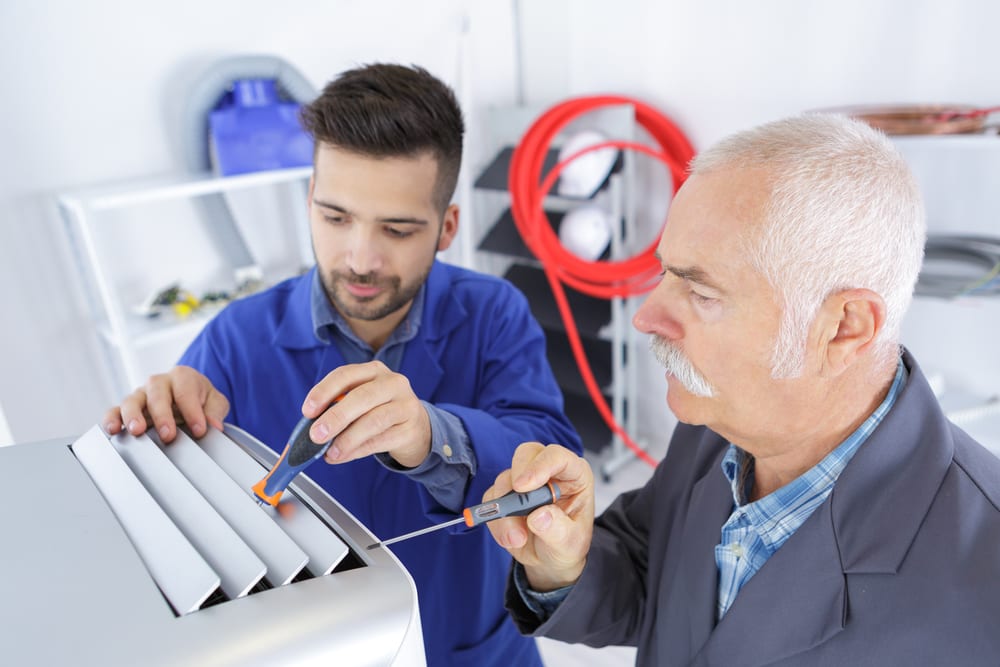Although it is not uncommon to see high temperatures in April, it is the middle months of summer in which individuals and businesses use air conditioning the most. Homeowners with central air know that starting up the AC for the first time can be a hit or miss experience. If it is a hit, great. If it is a miss, before you contact an HVAC repair expert, consider the following ways that you may be able to address the problem yourself.
Things to Check for Inside Your House
It is frustrating when the weather starts warming up, you turn on your AC, and nothing happens! So what should you do to fix the problem?
For homeowners with outdoor AC units, it is easy to believe that all AC problems begin out there. But if AC did not kick on or your home is not cooling down the way it should be, take the following steps inside before you head outside.
1. Check to See Whether the Thermostat is Set Properly
Do not be afraid to admit you do not know how to operate your thermostat, especially if it is digital or a smart thermostat. Learning anything new can be intimidating. An experienced HVAC tech will be happy to explain your system to you.
Once you know how to operate it, check to make sure that your settings are correct, and the AC is turned on. If not, it’s time to call in the pros.
2. Confirm that the Filter is Clean
It is common for homeowners to overlook AC filters. As with any type of filter, your AC filter needs to be checked, cleaned, and replaced regularly. You need to check it monthly. Depending on how clogged or dirty it is, you may need to switch it out more frequently or talk to an HVAC professional about heavy-duty filters.
For households that have people who suffer from seasonal summertime allergies, it can be helpful to consider the benefits of a HEPA filter, which can block these particles from making their way into their HVAC systems. These filters are typically very affordable.
3. Make Sure Air Flow is Not Blocked
Every homeowner wants to showcase their house. Each piece of furniture must be placed just so. However, placing furniture or anything else in front of a vent not only blocks the airflow from your AC in the winter, but it can also cause a fire from your furnace in the winter.
In some cases, you may have a build-up of debris in your air ducts. This can cause your air conditioner to attempt to work harder to push the same amount of air through, which can compromise the efficiency of your unit. Fortunately, your friendly local HVAC experts can help with that, too, by providing comprehensive duct cleaning services.
This simple checklist is the first step as a homeowner to determine what may be reducing cool air from your AC unit. These may seem like basic steps, but you will be surprised how simply moving things from in front of vents can cool things down.
But if these steps did not change anything, you need to head outside or call in a professional to diagnose the problem.
External Factors that Influence Your HVAC
There are a number of things outside that may be influencing your HVAC system. If any of these problems arise, they can be easily identified by a trained HVAC professional, who can usually address the problem the very same day.
Landscaping
Check to see what is growing around your outdoor unit. Summertime is when grass, weeds, and wildflowers grow the most. Clear out everything around the unit so that it has the ability to bring in plenty of fresh air.
Any time that plants grow up around the unit, they can insulate it, heating it and preventing proper air flow. Avoid planting shrubs or flowers near the AC unit. Even decorative rocks can be problematic. Trees are not any better because falling leaves get stuck in the ACs fan, which can lead to additional problems.
When you schedule a regular tune-up for your HVAC system, your technician can help to clear out any debris that may be affecting the performance of your system. They can even take apart certain components on the interior of your unit to make sure that they are fully clean, clear, and ready to operate.
Outdoor Electrical Cords
AC units that are outside the home have electric cords that allow them to operate. If you hire lawn companies to take care of your yard, point out where those cords are located. AC electrical cords often become unintentional victims of weed whackers and other trimming devices.
So now you have looked at everything, inside and outside, except the AC itself. When an AC unit simply stops working, it is usually because the HVAC compressor has gone bad. When that is the case, it’s time to call in professional HVAC technicians to help.
Call Out Professionals to Explore the Problem
There are several other factors that may be affecting the performance of your HVAC unit. Let’s take a look at the most common ones.
Drain Lines Need to Be Unclogged
AC units rely on drain lines to balance humidity levels. These lines ensure that there isn’t too much moisture in the air of your home. Unfortunately, clogged drain lines are one of the main reasons why AC units do not work properly. Fortunately, this problem is easily addressed by an experienced HVAC technician.
Refrigerant Needs to Be Replaced
Refrigerant is the liquid that runs through the AC unit that allows it to blow out cool air. Like the AC in a vehicle, it should be checked if it emits an odor while it is running. If the AC is blowing out air, but it is hot, it could be because the refrigerant is gone or has leaked out.
If it just needs to be replaced, that is simple for a professional to address. Likewise, if there is a leak in the line, you will need to hire an HVAC repair expert.
HVAC Compressor Needs to Be Repaired
This may not be what you want to hear. When you have checked everything else, that leaves the compressor. This is essentially the motor of the air conditioner. Any of the issues mentioned above can lead to compressor failure. Drain problems, electrical issues, and refrigerant leaks can ultimately cause compressors to stop working.
If it is not the HVAC compressor itself, it may be one of the capacitors that is responsible for providing energy to the compressor. The start capacitor and the run capacitor work just like their names suggest. The start capacitor provides energy to start the AC motor, and the run capacitor provides energy to keep it running.
If either of these capacitors stops working, the compressor also stops working. Repairing anything involving the compressor, including the capacitors, requires a professional AC repair service.
Taking all of this into consideration is important for homeowners who want to maintain or grow the value of their homes. Scheduling annual maintenance checks of major systems like your HVAC — and following technician recommendations — can help you to keep your home in good repair while increasing energy efficiency and saving money.
Professional AC Repair Near Me
When you need problems with your AC to be addressed right away, reach out to the experienced technicians at Castle Home Comfort Heating & Cooling. Contact us for a consultation or to get a technician out to your home today.

